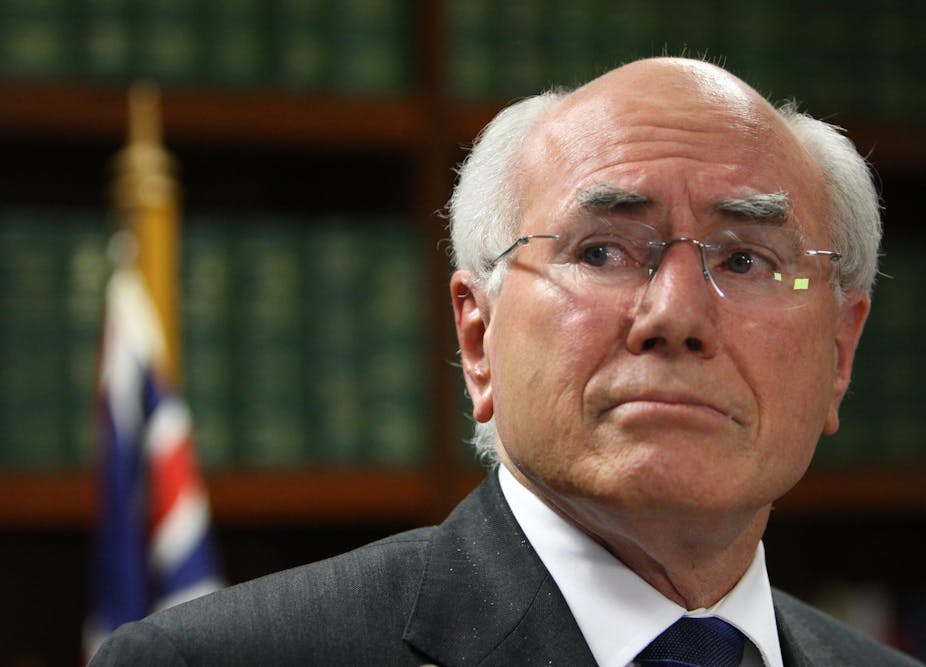A recent publication by the International Monetary Fund provides examines government fiscal policy in 55 major economies. The report employs the rather loaded terminology of “prudence” or “profligacy” to evaluate government policies. In essence it judges whether the level of public debt is one that future budget surpluses could expect to cover.
Inevitably, the report has been dragged into contemporary Australian political debate. It makes no direct comment on the Howard government but commentators have seized on a single graph that identifies “fiscal profligacy” by the Howard government during 2003 and 2005-2007. Too much has been made of this.
Critics of the Howard government have delighted in the opportunity to malign its fiscal policy. During the Howard years, prominent academic Judith Brett perceived a drift of the “moral middle class”, once the backbone of the old right, towards the left. John Howard’s fiscal critics such as Andrew Leigh and Stephen Koukoulos are a contingent of this class; the economist equivalents of Robert Manne or Greg Barns.
With socialism, or even old-style social democracy, entirely off the agenda in Australia much of the left now finds some solace in Howard’s conviction of “fiscal profligacy”. Their critique has found some reinforcement from some of the right who were disenchanted with John Howard’s fiscal pragmatism; Andrew Norton complained that his was the government of a “conservative social democrat”.

Behind the political prejudice there was some accuracy in the liberal economists’ critique of the Howard government. Howard was not a laissez-faire economic liberal. Rather, like his hero Robert Menzies, he wished to encourage in Australia the “vigorous virtues” of self-reliance, personal responsibility and industriousness.
Both Howard and Menzies believed that government could support these values if it ensured an equation of moral desert and financial reward. Both Liberals championed the public subsidy of private social provision in health and welfare. To Howard, as much as any social democrat, formal freedom was empty without the means to access it. Both supported the continuation of a public health and education sector.
The combination of public and (subsided) private provision is expensive. Labor’s commitment to winding back the subsidy of private provision has enabled it to reduce government expenditure compared to the Howard government. Howard was always concerned about the electoral implications of taxation, but his road was eased by the economic prosperity of most of his term, voters were less insistent in their demand for tax cuts than they had been in the 1980s. Still, consistent free marketers were disappointed in his government.
In the last decade, then, both major parties have made fiscal appeals that contradict stereotypes. Labor’s 2007 boast of “economic conservatism” and Howard’s commitment to an active public sector.

The question remains as to whether these appeals worked with voters or whether parties better off sticking to their traditional images. The 2004-2010 reports of the Australian Election Survey trace the war of perceptions. At the 2004 election, the Coalition had closed Labor’s electoral advantage on its traditional areas of health and education to historic lows, but by 2007 Labor had reopened its advantage in these areas to levels higher or comparable to the polarised election of 1993.
The apparent failure of the Coalition’s 2001-2004 offensive into the policy territory of their enemies was echoed in Labor’s experience after 2007. Kevin Rudd as opposition leader championed his “economic conservatism”. The global financial crisis, however, saw Labor reverse its rhetorical position to champion Keynesian stimulus. In 2010 many Labor activists believed that the party must benefit by its globally recognised stewardship of the Australian economy during the Global Financial Crisis.
After Labor’s narrow electoral some of the party’s supporters complained that many voters had fallen for Liberal promises to “stop the waste”. In fact there is little evidence that voters were alarmed about Labor’s fiscal record, they were concerned about living standards but it was more significant that Labor’s advantage on health and education notably declined and this contributed to the surge in support for the Greens.
The image of a political party is hard to change as the American Republicans have found to their cost. When a party enjoys a surge of support it is likely to undermine (but only briefly) its opponents areas of issue strength. In 2007 the Liberals lost ground on economic management, and the tide of elite criticism of Howard’s “extravagance” probably played a role here. Parties can steal their opponents’ clothes but the electoral advantage they secure from this is transitory. Labor seems to have taken this advice on board its decision to drop its commitment to a budget surplus in favour of a focus on employment levels speaks to the party’s strengths.
The focus of the Coalition will not on Tony Abbott’s maternity leave proposals but on taxation and border security. Arguments about Howard’s fiscal record will fascinate media elites and contrarians, but their real world impact is minimal.

